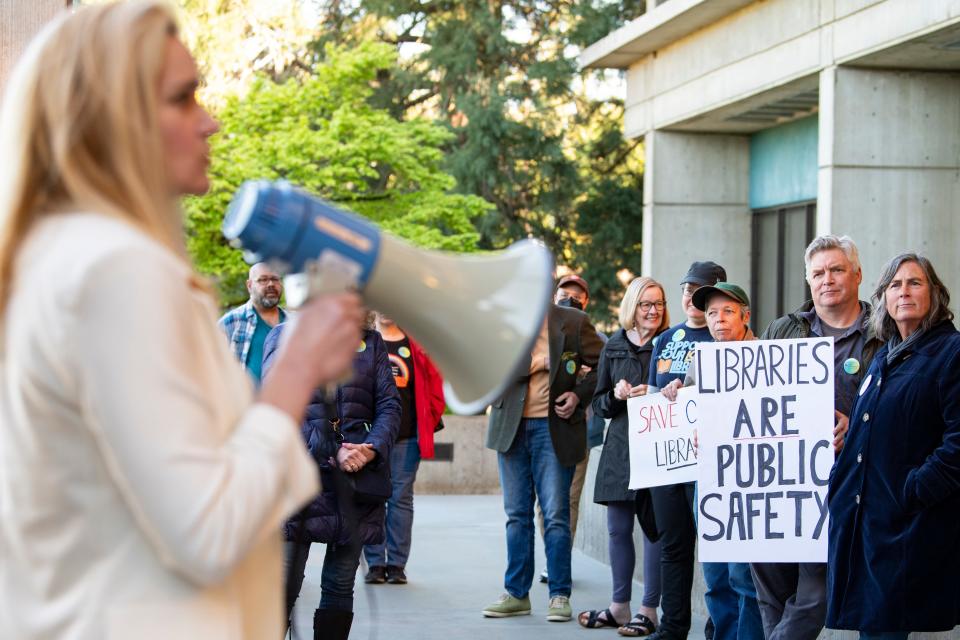A majority of potential voters surveyed in Salem oppose all levy options to address the multimillion-dollar budget deficit facing the city.
City officials said the survey found that while residents support public safety, parks and library services, 60% of respondents expressed hesitation to raise taxes to fund those services at this time.
The results of the poll come as the City Council and city leaders are considering a public safety levy to fund police and fire services or a community livability levy to fund the library, parks and senior services.
Those services face cuts and reductions if the city does not address its revenue shortfall.
“We will continue to be proactive and look for cost savings as we manage your tax dollars,” City Manager Keith Stahley said. “While current revenues don’t cover day-to-day costs to operate the city, we will continue to share what we learn about the funding challenges ahead, listening to the community about their preferences for our city and how we approach these systemic issues going forward.”
Poll results will be reviewed and discussed by the City Council during a work session on Monday.
The poll of 400 residents conducted by DHM Research found the public safety levy to be slightly more popular than the community safety levy, though both failed to garner a majority of support.
According to researchers, 58% of respondents said they would likely not support or certainly not support a public safety levy to fund police and fire services at a rate of $1.50 per $1,000 assessed value, costing about $351 a year for the typical home.
After learning of the cost of the levy and the positions it could fund, support for it increased from 34% to 40%.
When asked about the community livability levy, 59% of respondents said they would likely or certainly not support a $150 per $1,000 assessed value levy to fund libraries and parks.
Council authorized a poll of likely voters, funded by replacing budget authority for an annual community satisfaction survey with a poll specific to the question of community priorities and preferences for possible future funding.
The poll was conducted Sept. 10 through Sept. 16 in both English and Spanish. The survey captured responses from 400 residents via cellphones, landlines and an online option. City officials said to achieve a representative sample of likely voters in a special election of an odd-numbered year, quotas were set for gender, age, ward and political affiliation.
DHM Research staff said the purpose of the survey was to gauge voter support for potential public safety and community livability levies, test voter tolerance for different levy rates and identify voter preferences for how revenue would support specific staffing and services.
The survey found that although a majority of respondents — 57% — thought the city was on the “wrong track,” voter mood had improved since 2022, when it was 69%.
Homelessness was far and away the most pressing problem facing the city, with 54% of respondents listing it as the top issue. Public safety placed second with 22%.
Revenue decision to ‘shape the future of the city for decades to come’
Stahley said the solutions to addressing the city’s budget shortfall will “shape the future of the city for decades to come.”
Failure to generate more revenue will result in closed fire stations, layoffs, shuttered libraries and reduced services, city leaders said.
Hundreds in the community have pushed for a “livability levy” to fund the library, parks and Center 50+. Dozens sent in testimony in favor of the levy. During the last revenue meeting in August, leaders referenced the possibility of a public safety levy to fund police and fire services. One proposed rate would mean an owner of a $300,000 house would pay an additional $500 a year in property taxes.
Salem residents will likely vote on a property tax levy to offset a multimillion-dollar deficit in the city budget next year.
The details of the plan, including what the levy would fund and when it would go to vote, remain to be decided.
Stahley outlined three possibilities for the timeline of such a levy.
Option 1: Salem levy put to voters in May 2025 election
Option 1 would be to put the property tax levy up for a public vote in the May 2025 election. If passed, the 2026 budget would face limited reductions and the city would begin receiving money by November 2025.
The council would need to vote by the end of February to put the issue on the ballot. The benefits of voting on the issue in May include limited cuts and the opportunity to vote again in November if the measure fails.
On the downside, the May election allows for only a limited time for education and public outreach.
Option 2: Salem levy put to voters in November 2025 election
Option 2 would be to vote on the measure in November 2025 and make significant budget cuts in the meantime. If passed, funds would be received by November 2026 and would first need to be used to restore services.
Option 3: Salem levy put to voters in November 2025 election, limit cuts by using city’s fund balance
Option 3 would be to vote on the measure in November 2025 and limit cuts by using the city’s fund balance. This option means services could remain continuous, but depleting the fund balance negatively impacts the city’s bond rating. If the measure fails, the city would have to immediately layoff a big portion of staff.

Salem taxes, levy recommended by task force
Monday was the second work session following the conclusion of the city’s Revenue Task Force.
The group was convened in January to consider ways to increase revenue and address the multimillion dollar budget shortfall. The group met seven times, considered feedback from eight focus groups, three town halls and a statistically valid poll, and deliberated on revenue recommendations to the City Council.
The meetings happened in parallel to the Citizen Budget Committee, which deliberated various cuts and service reductions to contend with the disparities between revenue and expected services. Several key items such as library jobs and hours, park events, splash fountains and drinking fountains were on the chopping block until being saved by reallocating one-time funds.
A property tax levy, personal income tax, business license fees and tax reform were among the recommendations the Revenue Task Force made during their first work session in July. The recommendations require a council vote before any can move forward.
Stahley honed in on two recommendations: a franchise fee increase and a local option property tax levy. He said the city would also work to support the state Legislature passing a payment-in-lieu-of-taxes due to the large number of state-owned land in the city.
Different revenue options needed after failure of the payroll tax
Last year, city leaders pinned their hope of addressing the budget shortfall on an employee-paid payroll tax for all work done within city limits.
The council voted to pass the 0.814% tax on wages for all work done in Salem last year to address the budget shortfall.
The tax would have generated $27.9 million annually and cost a person earning the average hourly rate of $29.90 the equivalent of $506.24 a year. It was set to fund police, fire and homeless services.
Oregon Business & Industry, a statewide chamber of commerce and trade association, launched an effort to refer the tax to voters. The payroll tax was resoundingly defeated in the November special election.
The failure of the payroll tax cemented the idea among leaders that both community and council buy-in will be vital for any revenue decision going forward.
At an August meeting to discuss revenue options, Salem leaders agreed to conduct polling to see what kind of levy voters would support.
“I think we have to do polling,” Mayor Chris Hoy said during the meeting. “I think it’s important to find out what the community is ready to prioritize and pay for. I think it’s important that we look at a combination of services and not just single issues.”
For questions, comments and news tips, email reporter Whitney Woodworth at wmwoodworth@statesmanjournal.com, call 503-910-6616 or follow on X @wmwoodworth
This article originally appeared on Salem Statesman Journal: Most Salem voters say they would not support a property tax levy
EMEA Tribune is not involved in this news article, it is taken from our partners and or from the News Agencies. Copyright and Credit go to the News Agencies, email news@emeatribune.com Follow our WhatsApp verified Channel




